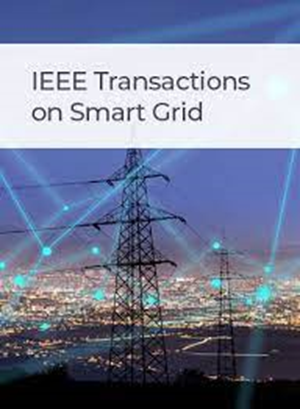A Dynamic and Static Combined State Recovery Method Against FDI Attacks in Power Grids
IF 8.6
1区 工程技术
Q1 ENGINEERING, ELECTRICAL & ELECTRONIC
引用次数: 0
Abstract
The widespread integration of information technology into power systems increases their vulnerability to false data injection (FDI) attacks, where attackers can mislead the power system state estimator to produce incorrect results. Consequently, it is critical to identify the attack and recover the real system state of the power grid. The primary method of state recovery is to derive the real state from measurements covered by the static measurement protection (SMP) methods, which are expensive to apply. The dynamic reactance perturbation (DRP) methods are low-cost but may fail in some conditions to detect attacks due to the topology limitation. In this paper, we propose a dynamic and static combined defense (DSCD) method, which combines the DRP and SMP methods to identify attacks and enhance the resilience of the state estimator at a lower cost. First, we propose the framework of DSCD and derive the necessary and sufficient conditions for recovering the system state. Second, we develop a non-convex optimization model to implement DSCD and propose heuristic algorithms under two extreme scenarios. Using these algorithms, defenders have the flexibility to balance between cost and delay. Simulation results on four IEEE test systems validated the superior performance of the proposed DSCD method.针对电网中 FDI 攻击的动态和静态组合状态恢复方法
信息技术与电力系统的广泛集成增加了电力系统遭受虚假数据注入(FDI)攻击的可能性,在这种攻击中,攻击者会误导电力系统状态估计器,从而产生不正确的结果。因此,识别攻击并恢复电网的真实系统状态至关重要。状态恢复的主要方法是从静态测量保护 (SMP) 方法所涵盖的测量中推导出真实状态,但这种方法的应用成本很高。动态电抗扰动(DRP)方法成本低,但由于拓扑结构的限制,在某些情况下可能无法检测到攻击。本文提出了一种动静结合防御(DSCD)方法,它结合了 DRP 和 SMP 方法,以较低的成本识别攻击并增强状态估计器的弹性。首先,我们提出了 DSCD 框架,并推导出恢复系统状态的必要条件和充分条件。其次,我们建立了一个非凸优化模型来实现 DSCD,并提出了两种极端情况下的启发式算法。利用这些算法,维护者可以灵活地在成本和延迟之间取得平衡。在四个 IEEE 测试系统上的仿真结果验证了所提出的 DSCD 方法的优越性能。
本文章由计算机程序翻译,如有差异,请以英文原文为准。
求助全文
约1分钟内获得全文
求助全文
来源期刊

IEEE Transactions on Smart Grid
ENGINEERING, ELECTRICAL & ELECTRONIC-
CiteScore
22.10
自引率
9.40%
发文量
526
审稿时长
6 months
期刊介绍:
The IEEE Transactions on Smart Grid is a multidisciplinary journal that focuses on research and development in the field of smart grid technology. It covers various aspects of the smart grid, including energy networks, prosumers (consumers who also produce energy), electric transportation, distributed energy resources, and communications. The journal also addresses the integration of microgrids and active distribution networks with transmission systems. It publishes original research on smart grid theories and principles, including technologies and systems for demand response, Advance Metering Infrastructure, cyber-physical systems, multi-energy systems, transactive energy, data analytics, and electric vehicle integration. Additionally, the journal considers surveys of existing work on the smart grid that propose new perspectives on the history and future of intelligent and active grids.
 求助内容:
求助内容: 应助结果提醒方式:
应助结果提醒方式:


